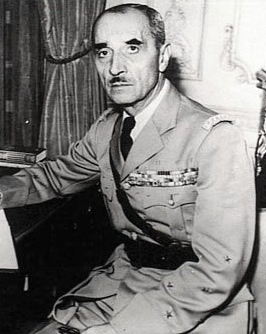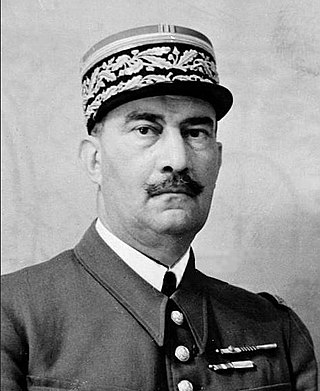
The State of Greater Lebanon, informally known as French Lebanon, was a state declared on 1 September 1920, which became the Lebanese Republic in May 1926, and is the predecessor of modern Lebanon.

The Anglo-Iraqi War was a British-led Allied military campaign during the Second World War against the Kingdom of Iraq, then ruled by Rashid Ali al-Gaylani who had seized power in the 1941 Iraqi coup d'état with assistance from Germany and Italy. The campaign resulted in the downfall of Gaylani's government, the re-occupation of Iraq by the British, and the return to power of the Regent of Iraq, Prince 'Abd al-Ilah, a British ally.

Middle East Command, later Middle East Land Forces, was a British Army Command established prior to the Second World War in Egypt. Its primary role was to command British land forces and co-ordinate with the relevant naval and air commands to defend British interests in the Middle East and eastern Mediterranean region.

The Syria–Lebanon campaign, also known as Operation Exporter, was the invasion of Syria and Lebanon in June and July 1941 by British Empire forces, during the Second World War.

Georges Albert Julien Catroux was a French Army general and diplomat who served in both World War I and World War II, and served as Grand Chancellor of the Légion d'honneur from 1954 to 1969.

Lebanese Independence Day is the national day of Lebanon, celebrated on 22 November in commemoration of the end of the French control over Lebanon in 1943, after 23 years of Mandate rule.

Henri Fernand Dentz was a general in the French Army who served with the Vichy French Army after France surrendered during the Second World War. He was tried as a collaborator after the war.

The 1st Free French Division was one of the principal units of the Free French Forces (FFL) during World War II, renowned for having fought the Battle of Bir Hakeim.

The Battle of Damascus was the final action of the Allied advance on Damascus in Syria during the Syria–Lebanon campaign in World War II.

The Battle of Damour was the final major operation of the Australian forces during the Syria-Lebanon Campaign of World War II.

The Battle of Beirut marked the end of hostilities in the Syria–Lebanon campaign of World War II.
The French State, popularly known as Vichy France, as led by Marshal Philippe Pétain after the Fall of France in 1940 before Nazi Germany, was quickly recognized by the Allies, as well as by the Soviet Union, until 30 June 1941 and Operation Barbarossa. However, France broke with the United Kingdom after the destruction of the French Fleet at Mers-el-Kebir. Canada maintained diplomatic relations until the occupation of Southern France by Germany and Italy in November 1942.

The Battle of Deir ez-Zor was part of the Allied invasion of Syria during the Syria-Lebanon campaign in World War II.
The Czechoslovak 11th Infantry Battalion – East was a Czechoslovak infantry battalion in the Second World War. It served under the British Middle East Command in the Mediterranean and Middle East Theatre.

The Air Force, usually referred to as the Air Force of Vichy or Armistice Air Force for clarity, was the aerial branch of the Armistice Army of Vichy France established in the aftermath of the Fall of France in June 1940. The Vichy French Air Force existed between June 1940 and December 1942 and largely served to defend Vichy French territories abroad.
The Army of the Levant identifies the armed forces of France and then Vichy France which occupied, and were in part recruited from, the French Mandated territories in the Levant during the interwar period and early World War II. The locally recruited Syrian and Lebanese units of this force were designated as the Special Troops of the Levant.

The 6th Foreign Infantry Regiment was an infantry regiment of the Foreign Legion in the French Army from 1939 to 1941 and again from 1949 to 1955.

Events in the year 1941 in the British Mandate of Palestine.

The Armistice Army or Vichy French Army was the armed forces of Vichy France permitted under the terms of the Armistice of 22 June 1940. It was officially disbanded in 1942 after the German invasion of the "Free Zone" which was directly ruled by the Vichy regime.















